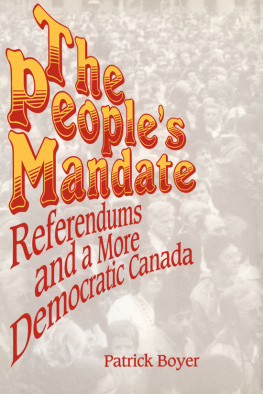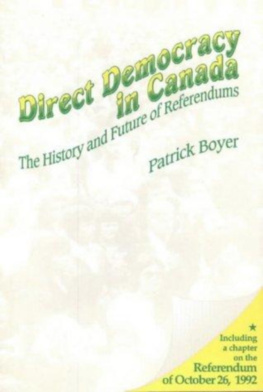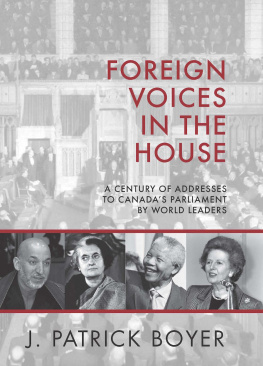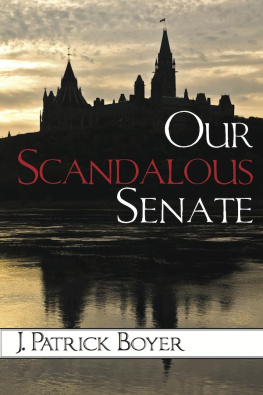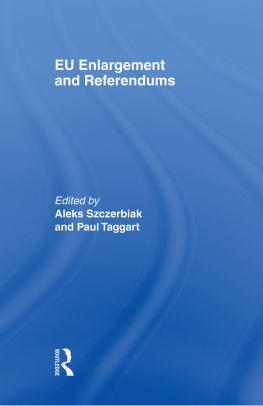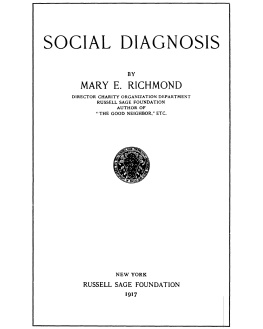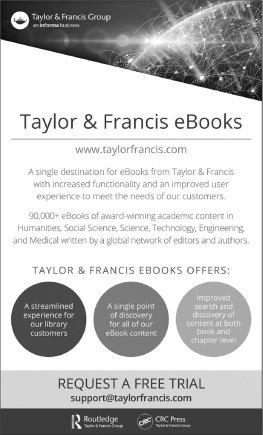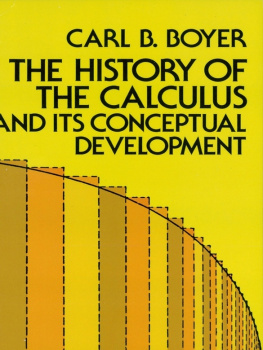Copyright Patrick Boyer, 1992
All rights reserved. No part of this publication may be reproduced, stored in a retrieval system, or transmitted in any form or by any means, electronic, mechanical, photocopying, recording, or otherwise (except brief passages for purposes of review) without the prior permission of Patrick Boyer, obtained through Dundurn Press Limited. Permission to photocopy should be requested from the Canadian Reprography Collective.
Editing: Erika Krolman
Design and Production: GSN
Cover Design: Ron and Ron Design
Printing and Binding: Gagn Printing Ltd., Louiseville, Quebec, Canada
The publisher wishes to acknowledge the generous assistance and ongoing support of The Canada Council, The Book Publishing Industry Development Programme of the Department of Communications, The Ontario Arts Council, and The Ontario Publishing Centre of the Ministry of Culture and Communications. The author neither sought nor received any government grants in connection with the writing of this book.
Care has been taken to trace the ownership of copyright material used in the text. Credit for each quotation is given at the end of the selection. The author and publisher welcome any information enabling them to rectify any reference or credit in subsequent editions.
J. Kirk Howard, Publisher
Canadian Cataloguing in Publication Data
Boyer, Patrick
The peoples mandate
Includes bibliographical references and index.
ISBN 1-55002-147-8
1. Referendum Canada. 2. Plebiscite Canada.
I. Title. II. Title: Lawmaking by the People.
JF493.C34B6 1992 328.271 C91-095603-0
Dundurn Press Limited
2181 Queen Street
Suite 301
Toronto, Canada
M4E 1E5
Dundurn Distribution Limited East
73 Lime Walk
Headington, Oxford
England
OX3 7AD
This book is dedicated to Canadas First Peoples, whose mandate is a simple one but has yet to be fully heeded by all who now live in this land.
Books by Patrick Boyer
The Egalitarian Option (contributor) (1975)
Political Rights: The Legal Framework of Elections in Canada (1981)
Lawmaking by the People: Referendums and Plebiscites in Canada (1982)
Money & Message: The Law Governing Election Financing, Advertising, Broadcasting and Campaigning in Canada (1983)
Election Law in Canada (1987)
Local Elections in Canada (1988)
Foreword
When I began work in the summer of 1984 on the project that was to become an international television series called The Struggle for Democracy, I felt that we in Canada took democracys benefits too much for granted and would be stimulated and perhaps provoked into a greater degree of participation in our own democracy by travelling through the struggles, the bloodshed, the intellectual labour, the whole very dramatic and often very dangerous theatre of real life that had won us the rights, freedoms, and powers that we enjoy. All over the world, I felt, democracy was bursting to get out of its bonds in nations that had never known it, or had known and lost it; so it seemed timely to ask through the medium of film where this political treasure had come from, what it was made of, and where it might go.
The funny thing is, I thought I was pretty clear about the nature of democracy before I began serious work on the project. It was only after I was irreversibly launched that I began to realize how deep and complex and contradictory the subject is, how resistant to definition, and how various in its expressions, as various as the hundreds of different cultures in which it is growing or yearning or striving for expression. But there was one overriding issue about which I held deep convictions from the start: citizen participation. Early in the 1970s, I had been privileged to head a national task force on citizen participation in the national decision-making process, under the direction of then undersecretary of state Bernard Ostry. My interest in the issue remained strong thereafter. And the deeper I went into the subject as The Struggle for Democracy evolved from a two-page proposal into a fifty-page series outline and then a whole production machine that was soon to roll out hundreds of thousands of feet of film and propel me and my team over hundreds of thousands of air miles, the more I became convinced that one dominant political theory of our time was wrong.
Many traditional liberal political theorists advocate a democracy in which the power is in the hands of lites and bureaucracies and the population consists of docile clients served by its governments rather than of genuine citizens deeply involved in the democratic process themselves.
In Praise of Apathy,you might call it. Active citizens, the theory goes, mess things up; if citizens keep quiet, vote obediently from time to time to legitimize the process, and let the experts get on with good government, democracy will achieve its best objectives. I came to feel that this theory was not only wrong but vicious and in the end a serious threat to the survival of democracy itself.
I have since written and spoken publicly, in a number of forums, about the related danger of charismatic electoral politics in which candidates make impossible promises, and sadly sometimes convince voters of the reality of those promises. I felt that the political leader as hero or saviour could generate only disappointment, social anger, and cynicism.
We are seeing it now.
And I have come to believe that the antidote lies in changing our attitudes towards direct democracy; it lies in the greater participation of citizens through a number of mechanisms including those discussed in this book.
I myself, however, yielded to cynicism (an attitude I characteristically deplore); I felt that the beneficiaries of the present system policy lites and certainly members of Parliament would be entrenched in hostility towards any reforms of this nature.
And now along comes this fascinating exploration of the same issues by a practising parliamentarian!
How Patrick Boyer finds the time and energy to be an active parliamentarian, an amateur historian, and a political theorist all at once escapes my understanding, but I am glad he does so.
One of the things that gives Canada its distinction is our willingness to constantly re-examine what we have made and where we are going. The country is deeply into that process again as I write. Patrick Boyers widely researched study and judicious display of the issues flowing from these great democratic questions, situated in the Canadian context, will be of service to Canada as we strive to carry forward the essential and characteristically Canadian political task of refashioning our society towards the always elusive but thank God always beckoning goals of greater civility, greater generosity, greater sensitivity, and in the present context of prime importance greater citizenship.
I write as a still-fascinated, still-bemused, and still hopeful observer of the long, tangled, messy, and unpredictable story of democracy. This book is timely, rich in texture, insightful, and not without surprises.


